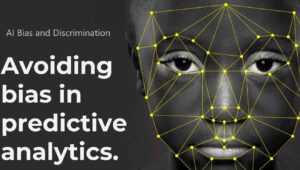
AI Bias and Discrimination
The Rise of AI Bias and Discrimination:
In the age of technology, Artificial Intelligence (AI) has become an integral part of our lives. From personal assistants like Siri and Alexa to self-driving cars, AI is reshaping how we live and work. However, as AI becomes more prevalent, there is growing concern about AI bias and discrimination. The algorithms used in AI systems can be biased and perpetuate discrimination, leading to unfair outcomes for certain groups of people. This has led to a call for ethical AI development that prioritizes fairness and transparency. This short article will explore the rise of AI bias and discrimination, its consequences, and the need for a call to action for ethical AI development.
Understanding the impact of biased AI systems:
AI systems are designed to learn from data and make predictions based on that data. However, these systems are only as good as the data they are trained on. If the data used to train an AI system is biased, the system will also be biased. This can lead to unfair outcomes for certain groups of people. For example, facial recognition technology needs to be more accurate for people with darker skin tones, which can lead to misidentification and wrongful accusations.
Moreover, AI bias and discrimination can perpetuate existing societal inequalities. For instance, an AI system used in hiring may discriminate against women or people of colour, perpetuating existing biases and preventing diversity in the workplace. This has significant implications for the future of work and the economy.
Examples of AI bias and discrimination in real-life scenarios:
AI bias and discrimination are not theoretical issues but real-life problems. One example of AI bias is the use of predictive policing technology. Predictive policing uses algorithms to predict where crimes are likely to occur and who will commit them. However, this technology is biased against communities of colour, leading to over-policing and unfair treatment.
Another example is the use of AI in healthcare. AI systems are being developed to assist doctors in diagnosing diseases and predicting patient outcomes. However, if the data used to train these systems is biased, the techniques could perpetuate healthcare disparities and lead to misdiagnosis and mistreatment.
The importance of ethical AI development:
Given the potential consequences of biased AI systems, it is essential to prioritize ethical AI development. Ethical AI development means ensuring that AI systems are fair, transparent, and accountable. It also means considering AI systems’ social and ethical implications and designing them to promote human values such as fairness, justice, and dignity.
Ethical AI development is not just a moral imperative but also a business imperative. Companies that prioritize ethical AI development are more likely to gain the trust of customers and stakeholders, which is essential for building long-term relationships. Additionally, ethical AI development can lead to better outcomes for all stakeholders, including employees, customers, and society as a whole.
Steps to take towards ethical AI development:
To ensure ethical AI development, AI developers and policymakers can take several steps. First, they must recognize the potential for bias and discrimination in AI systems and take steps to mitigate these risks. This includes ensuring that the data used to train AI systems is diverse and representative of all groups of people and monitoring AI systems for bias and discrimination.
Second, they must prioritize transparency and accountability in AI development. This means making AI systems more explainable and understandable to users and ensuring that AI systems are auditable and accountable for their decisions.
Finally, they must consider AI systems’ social and ethical implications and involve stakeholders in the development process. This includes engaging with diverse communities and evaluating the impact of AI systems on vulnerable populations.
Key considerations for AI developers and policymakers:
AI developers and policymakers must consider several vital considerations when developing and regulating AI systems. First, they must ensure that AI systems are designed to promote human values such as fairness, justice, and dignity. This means creating AI systems focusing on human-centred values and considering AI systems’ social and ethical implications.
Second, they must prioritize transparency and accountability in AI development and regulation. This means making AI systems more explainable and understandable to users and ensuring that AI systems are auditable and accountable for their decisions.
Finally, they must involve stakeholders in developing and regulating AI systems. This includes engaging with diverse communities and considering the impact of AI systems on vulnerable populations.
The role of education and awareness in preventing AI bias and discrimination:
Education and awareness are essential in preventing AI bias and discrimination. This includes educating AI developers and policymakers on the potential for bias and discrimination in AI systems and providing training on ethical AI development. It also means raising awareness among the general public about the potential consequences of biased AI systems and the importance of ethical AI development.
Moreover, education and awareness can help to promote diversity in AI development. By encouraging more women and people of colour to enter the field of AI, we can increase diversity in AI development and reduce the potential for bias and discrimination.
The ethical implications of AI in healthcare, finance, and law enforcement:
AI has significant implications for healthcare, finance, and law enforcement. In healthcare, AI systems are being developed to assist doctors in diagnosing diseases and predicting patient outcomes. However, if the data used to train these systems is biased, the techniques could perpetuate healthcare disparities and lead to misdiagnosis and mistreatment.
AI systems are being developed in finance to assist with credit scoring and risk assessment. However, if the data used to train these systems is biased, the techniques could perpetuate financial disparities and lead to unfair treatment.
In law enforcement, AI systems are being developed to assist with predictive policing and facial recognition. However, if the data used to train these systems is biased, the techniques could perpetuate policing disparities and lead to over-policing and unfair treatment.
The future of AI and the importance of ethical AI development:
The future of AI is bright, but it is also fraught with potential risks. The potential for bias and discrimination in AI systems increases as AI becomes more prevalent. This has significant implications for the future of work, the economy, and society as a whole.
However, by prioritizing ethical AI development, we can ensure that AI systems are fair, transparent, and accountable. We can also ensure that AI systems promote human values such as fairness, justice, and dignity. This will require a concerted effort from AI developers, policymakers, and the general public.

importance of ethical AI development
Conclusion:
AI bias and discrimination are actual and pressing issues that require a call to action for ethical AI development. By prioritizing fairness, transparency, and accountability in AI development, we can ensure that AI systems promote human values and do not perpetuate discrimination and inequality.
